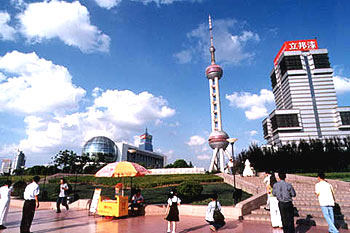The air is getting cleaner and the sky bluer in Shanghai, the busy metropolis, the local environmental protection bureau said yesterday.
According to official figures, from 2006, 8 tons of dust per square kilometer fell on the city, down 23 percent on 2003. And in the same period, the concentration of inhalable particles per cubic meter of air dropped 11.3 percent to 0.086 mg.
As a result, 85 percent of the days last year were recorded as having "fair" or "good" air quality. And local people appear to have noticed the improvements.
According to a recent survey by the environment bureau, more than 65 percent of respondents said they had witnessed more days with clean air and blue skies.
A further 38 percent said they were getting less dust in their homes, while only about 14 percent said they thought the situation was deteriorating.
Yesterday's press release said that by the end of last year, about 30 percent of the city's land area had adopted effective measures to reduce dust.
A pilot scheme was launched in three downtown districts in 2004 in a bid to control dust levels.
At that time, a number of regulations, mostly concerning "clean" construction methods, were issued and all related government departments - from construction and transportation to security and city appearance - were mobilized to enforce them.
One of the key regulations stated all construction projects must include in their budgets measures for minimizing dust and pollution.
Bans were imposed on equipment and tools that create high volumes of dust and all loose materials, if left piled up for more than two days, must be regularly sprayed with water to avoid them dissipating into the air.
The transport of waste products must be carried out in a timely fashion and all loose materials must be suitably covered while in transit, the rules said.
In addition, all major roads in the city must be sprayed with water at least once a day and pavements every three days.
Anyone falling foul of the regulations faces a fine of up to 20,000 yuan (US$2,700), while rewards are offered to those reporting polluters.
(China Daily November 1, 2007)






